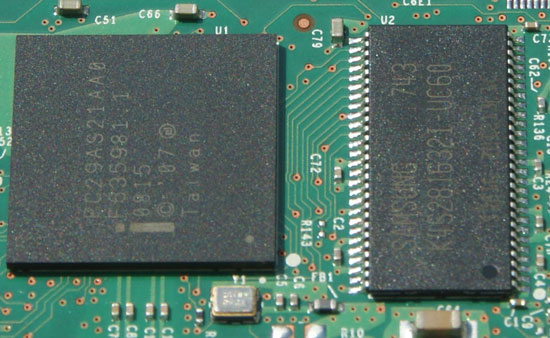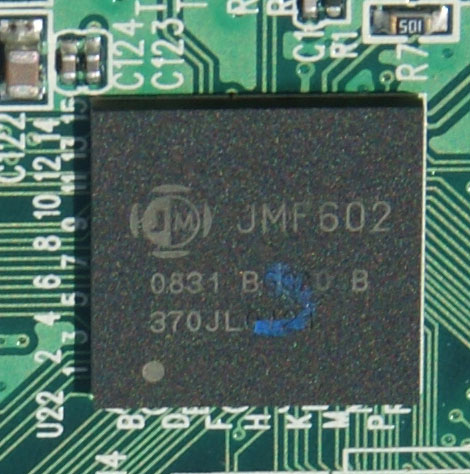Intel X25-M SSD: Intel Delivers One of the World's Fastest Drives
by Anand Lal Shimpi on September 8, 2008 4:00 PM EST- Posted in
- Storage
A Lack of DRAM or a Lack of Cache?
The high latency random write issue is annoying enough that it'd force me not to recommend any of the non-Intel MLC drives on the market today, regardless of how attractive their pricing may be. High performance with caveats isn't exactly high performance to me.

Intel's controller (left) + DRAM (right)
That being said, the root of the problem is still unknown. My first thought was that it was because the MLC drives had no DRAM buffer, and if you'll notice, Intel's MLC drive does have a DRAM buffer. I asked Intel about this and it turns out that the DRAM on the Intel drive isn't used for user data because of the risk of data loss, instead it is used as memory by the Intel SATA/flash controller for deciding exactly where to write data (I'm assuming for the wear leveling/reliability algorithms). Despite the presence of the external DRAM, both the Intel controller and the JMicron rely on internal buffers to cache accesses to the SSD.

Finding good data on the JMicron JMF602 controller is nearly impossible, but from what I've heard it's got 16KB of on-chip memory for read/write requests. By comparison, Intel's controller has a 256KB SRAM on-die. And I'm going to go out on a limb and assume that given Intel's experience with CPU caches, that its SRAM implementation is probably very well done.
With the JMicron based solutions, if you try and write too much to the drive (and trust me, it won’t take a lot) and the buffers get full, the controller tells the system that it’s not ready to write more data and you get a pause.
When you cause the JM602’s internal buffer to overflow, your system runs in bullet-time. Applications take much longer to launch and close, windows take longer to appear, and there are distinct pauses in anything you want to do that involves the disk. Want to send an IM? Well, that writes to an IM log - you can expect a pause before you can send your IM. Loading webpages is the worst, reading from and writing to the cache wreaks havoc on these cacheless MLC drives. Just for kicks I tried loading AnandTech while I was extracting a 5GB file on the SuperTalent 60GB MLC, it took over 10 seconds for the website to load. Once the JM602 was free to fulfill the read request, the website just popped up - but until then it was like my DNS was failing. It’s a lot like what happens to your notebook if you try and do too much, the disk quickly becomes a bottleneck.
Thankfully, as we've already seen, this problem is only limited to JMF602 based MLC drives. The SLC drives and the Intel MLC are totally fine, so while I'll include these problematic MLC drives in today's comparison, let me state now that I would not purchase one.
JMicron's roadmap shows a new controller next year with an integrated ARM core as well as support for external DRAM, which could alleviate these problems, but until now the controller, and drives based on it, aren't worth it. You get a much better overall experience out of a conventional mechanical disk drive, and much better performance from the Intel SSD or any of the SLC solutions on the market.
The Test
| CPU: | Intel Core 2 Quad Q9450 (2.66GHz) |
| Motherboard: | Intel DG45ID |
| Chipset: | Intel G45 |
| Chipset Drivers: | Intel 8.1.1.1010 (Intel) |
| Memory: | Corsair XMS2-8500 1066 |
| Video Card: | VisionTek Radeon HD 4850 |
| OS: | Windows Vista Ultimate 32-bit |










96 Comments
View All Comments
bharatwaja - Tuesday, September 9, 2008 - link
This is by far the best article I have ever read about SSDs... Anand you ROCK!!! and EVERYONE at ANANDTECH ROCKS!....Great article... Thank you........ you just saved me from spending $99 on a pretty much useless SSD.
[Takes a printout of Anand to worship]
hyperdoggy - Tuesday, September 9, 2008 - link
I noticed that ocz have released core v2 series of their ssd. It seems to come in a different size configurations than its 1st gen product, can you confirm if this is based on the same controller as its 1st gen product Anand?Also, i would love to see some ssd raid action since ssd does not lose its data when the array fails. I'm more interested to see if there is other limiting factor when you raid with such fast ssds, such as the motherboard chipset itself. If raiding two of those cheap $99 core 32gig ssd helps to reduce the write bug, it might be worthwhile buy, which was something i was thinking of doing till i read the review here.
And might i say, great review indeed Aanad.
bytekeeper - Tuesday, September 9, 2008 - link
Hi there. There is a discussion in the OCZ support forum aboutthe test results published in this article and the OCZ support
staff is thinking that you've got a faulty drive. Check here:
http://www.ocztechnologyforum.com/forum/showthread...">http://www.ocztechnologyforum.com/forum/showthread...
Is there any chance you can re run the test with another
Core drive or Supertalent/Patriot JMicron JMF602 victims?
Thanks.
Gary Key - Wednesday, September 10, 2008 - link
I posted results with a newly arrived Core drive straight off the shelf from Newegg in that thread. No changes to our initial results, although I will try a different controller later this week.Anand Lal Shimpi - Tuesday, September 9, 2008 - link
In total I have four drives based on the JMF602 controller: one from OCZ, SuperTalent, Patriot and Silicon Power.Of the drives, the OCZ Core is the oldest. If you look at page 9 in the article I've got a table that has the SuperTalent, Silicon Power and OCZ Core drives in it. The Silicon Power and SuperTalent drive both perform worse than the OCZ.
The situation gets more interesting if you look at the Iometer results for the drives, which I didn't publish in great depth but I did run internally. Average write latency goes down tremendously on the SuperTalent drive, but max latency more than doubled. I suspect that the SuperTalent drive may use a newer version of the JMF602, but the result is a reduction in real world performance - at least in the test cases I ran.
The inability to complete an OS install also applies to other drives. As I mentioned in the article I had the same problem with the SuperTalent MLC drive in OS X.
While there are undoubtedly ways of attempting to lessen the impact of the JMF602's poor design, I believe only a new controller will actually completely address these problems.
Take care,
Anand
yottabit - Tuesday, September 9, 2008 - link
This is why I love your website. Lots of your articles are so in-depth they make me think I'm reading some grad school journal that I should be paying money for.I actually first saw the Intel SSD article on TomsHardware, but didn't even bother to read it because I imagined it was going to say something like "OMG INTEL SSD ROX LOLZ SO MUCH FASTER THAN OTHER HDS"
I come here expecting to get a detailed analaysis, and that's always what you provide! Thank you so much.
My only gripe is you seem to have skipped a very basic test- dragging and dropping large files! You combine extracting files with other tests but you don't have any basic drag + drop tests I saw.
This rocks for the computer industry though. I personally couldn't believe so many people were buying the existing SSDs. This new Intel stuff looks like something that would actually make an improvement without compromises. I could certainly live with the capacity, I'm still running a 36GB raptor for my boot drive. Hah.
Dariusbird - Tuesday, September 9, 2008 - link
I'm proud to be working for the company producing these IC's. Nice work on the article.therealnickdanger - Tuesday, September 9, 2008 - link
It would be very nice to see where on all these charts the best 5400RPM 2.5" SATA drive would sit. Most laptop users have 5400RPM drives, so this would be MOST EXCELLENT to see the benefits of all these drives in comparison - especially the now "crappy" JM-based MLC drives.johncl - Tuesday, September 9, 2008 - link
I must congratulate Intel for adressing the issues with MLC and creating a brilliant product. Also thanks to the author of this article to point to the problem of MLC that seems to go by unnoticed by so many benchmark review sites.The initial price from intel is suggested retail price so I guess in a short while this should come down a bit, as its a bit over the top. As the author says, at around $400 this is a no-brainer for an enthusiast considering the improvement you will experience on your system. This is for me the most important advancement in computer technology in the last years and we are just starting to see the advantages of it. Besides the person sitting behind the keyboard, the slowest thing in your computer is the harddisk. You can swap CPUs and GPUs to your hearts desire, but eventually, percieved performance of a computer often boils down to how fast you get data in and out of system memory. SSDs will fix this technological void we have had for all these years with mechanical disks.
In general its about time we get rid of all mechanical parts in a computer, including fans. We need good cooling solutions built into our systems that rely on other means than rotating motors. If it means to stop the CPU speed race, then by all means do that, lets try to get todays performance but passively cooled. The SSD will walk hand in hand with this new trend in computing so we can get truly silent workstations. Amen to SSDs!
Gastrian - Tuesday, September 9, 2008 - link
I'm looking into creating a small multimedia PC where by I'll be archiving all my DVDs to DivX and running them through the PC instead of a DVD Player.Would I see any benefits in performance and acoustics (I don't want any noise from the PC interfering with my viewing) by having the OS on the Intel MLC SSD while storing the movies on a mechanical HDD?
Essentially I want to be able to sit down and browse my movies then pick one and watch it without having to worry about loading/transfer times and noise levels.